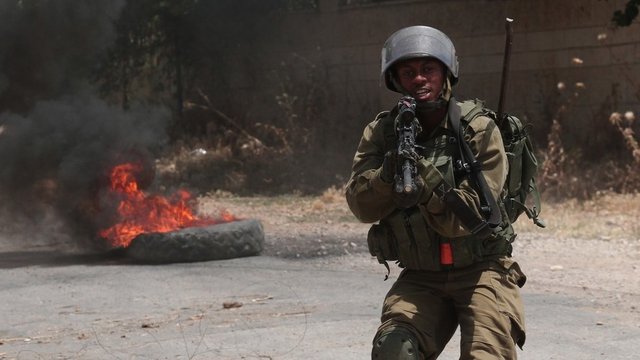Just two months since Netanyahu’s Likud party was re-elected with its biggest-ever number of seats, Israel has been thrown into chaos because he has failed to put together a coalition.
Netanyahu has now called for another election to be held on September 17. There is still no guarantee that it can create a parliament capable of forming a government. Netanyahu’s party had won its best-ever result with 35 seats in a parliament of 120 seats. The new opposition coalition Blue and White got 35 seats but once the results of all the other parties came through the right-wing had a majority of 65 over the opposition’s 55. No one doubted that Netanyahu was going to govern for another full term, making him the longest-serving prime minister in Israeli history.

© Mohamad Torokman © Reuters
His failure to put together a coalition was due to ultra-orthodox parties and the secular ultra nationalist party refusing to agree to continue the rule that ultra-orthodox Jews should not have to serve in the Israeli army. The former defence minister Avigdor Lieberman’s secular ultra nationalist party has been angry for some time that the ultra-orthodox were able to avoid the three years of armed service that is imposed on every other young Israeli.
Netanyahu denounced Lieberman, saying: “He has dragged the country to unnecessary elections due to his own political ego. The public chose me to lead the state of Israel. We will run a sharp and clear election campaign and we will win.”
After 40 days of negotiations Netanyahu faced a crisis, if he couldn’t form the coalition within 42 days of the election Israel’s president Reuven Rivlin could have asked the opposition leader to try and form a government. That would have given the leader of the Blue and White party, the former army chief Benny Gantz, the chance to form a coalition. This would have prevented Netanyahu’s plan to pass legislation exempting prime ministers from being charged with criminal activities. The 69-year-old Netanyahu faces potential indictments for fraud, bribery and breach of trust in three cases. His supporters are still planning to pass legislation which will grant him immunity whilst he remains prime minister.

© Getty Images / Nedal Eshtayah /Anadolu Agency
One immediate impact of the new election is that it has undermined any chance of progress by Donald Trump’s son-in-law, Jared Kushner, to negotiate a peace settlement. After meeting with Kushner, Netanyahu said: “Even though we had a little event last night that’s not going to stop us. We’re going to continue working together. We had a great productive meeting which reaffirms the alliance between the United States and Israel has never been stronger.”
The sad reality is that Kushner’s peace plan has not involved Palestinian refugees. Trump’s government has put on hold the details of its peace plan until after the new Israeli election. The Palestinian leadership said that Trump’s pro-Israel bias is a clear indication that there will be little for the Palestinians to enjoy in this deal. Although the Palestinians are to be excluded from the negotiations Kushner was planning to get several rich Arab Gulf states to invest billions to improve the quality of life of Palestinian refugees living in the Gaza strip or on the West Bank. These would have been the first round of US-backed negotiations since 2014.
Since the creation of the state of Israel in 1948 the ultra-orthodox Jews have been exempt from military service. The ultra-orthodox are around ten percent of Israel’s 8.5 million people, but they are growing fast as they tend to have larger families. Many will find this bizarre, but some of the ultra-orthodox Jewish sects refuse to recognise the state of Israel because they believe it can only be founded after the return of the Messiah. Many therefore boycott elections.
A key factor in Netanyahu securing his biggest-ever number of seats in the election was his hardline campaign in which he talked about annexing parts of the occupied West Bank and also threatened to introduce new laws that would curb the Supreme Court of Israel which has often made judgements that have offended Netanyahu.
It’s not just Trump who is a passionate supporter of the state of Israel. The recently re-elected prime minister of India, Narendra Modi, tweeted to his “dear friend” Netanyahu that he wanted to “take our bilateral partnership to new heights.”
The strongest criticism of Netanyahu’s government can always be found amongst the Palestinians. Senior Palestinian official Hanan Ashrawi said that Israelis had “overwhelmingly voted for candidates that are unequivocally committed to entrenching the status quo of oppression, occupation, annexation and dispossession in Palestine.” She continued that they had chosen “an overwhelmingly right-wing, xenophobic and anti-Palestinian parliament to represent them. Israelis chose to entrench and expand apartheid.”
Although the Israeli Labor Party governed Israel for its first three decades, they managed to win only six seats at this election. The Meretz party, the only Jewish party promising to end the occupation of the West Bank, which Israel seized in 1967, won only four seats. Four Arab parties went from 13 seats down to just ten because many Palestinians boycotted the election.
If Netanyahu can win the September election, he would use his fifth term to entrench his occupation of the West Bank, where over two and a half million Palestinians live, and would continue his blockade of Gaza, where two million more Palestinians live in what is called the largest open prison in the world.
US Secretary of State Mike Pompeo was recently questioned in the US Senate about Trump’s policy in the Middle East. He refused to denounce Israel’s continuing occupation of the West Bank or to support the long-standing US commitment to two states, one for the Israelis, one for the Palestinians, saying: “The old set of ideas are not worth retreading. They have not succeeded. I would argue that millions of man hours have been spent trying to build a two-state solution and it hasn’t worked to date.” A clear sign of the Trump administration’s intentions was revealed on March 21 when he endorsed Israel’s illegal annexation of the Golan Heights, which Israel seized from Syria in 1967.
During the election, Netanyahu’s main rival, Benny Gantz, the former army general, talked about flattening whole neighbourhoods with bombing raids. The 59-year-old former head of the Israeli armed forces only appeared on the political stage a few months ago after the decline of the traditional left-wing Israeli parties. Gantz maintained he was pro-peace, but his policies were little difference from those of Netanyahu. He declined to talk about Palestinian statehood and said that Israel should continue to control part of the West Bank.
Over the 71 years since the creation of the state of Israel its parliament has passed over 65 laws that undermine the rights of Palestinian citizens. Their racist impact on the people they target has clearly been a factor in spurring terrorism. It may sound bizarre but somebody living in Israel who is a Palestinian is not allowed to buy a home in most of the country and can be banned from living in a town unless they are determined to be “socially or culturally suitable”. In the state schools there is no teaching about Palestinian history and if a Palestinian in Israel wants to marry a Palestinian in the occupied territories they do not qualify for citizenship or residency.
Not surprisingly, these policies were supported by Netanyahu when he said: “Israel is not a state of all its citizens. According to the basic nationality law we passed, Israel is the nation state of the Jewish people and only it.” This prompted President Rivlin to say: “There are no first-class citizens, and there are no second-class voters. We are all equal in the voting booth. We are all represented at the Knesset [parliament].”
I desperately want to see Israel’s appalling abuse of the Palestinians brought to an end with the emergence of the two-state solution that was promised by the United Nations in 1948.
During the war of independence Israel drove over 700,000 Palestinians out of their homes and into the West Bank, which was then controlled by Jordan, and Gaza, which was controlled by Egypt. In the years that followed Israel’s foreign secretary often raised the issue of the refugees with prime minister Ben Gurion. The foreign secretary believed some refugees should be allowed to return to their homes and the quality of life for the others should be improved in Gaza and the West Bank. But this was dismissed by Ben Gurion who is believed to have said “the old will die and the young will forget.” But he was wrong. The old may have died but their children and grandchildren continue to live in the appalling conditions of Gaza or under the oppressive regime in the now Israeli-occupied West Bank.
Former Prime Minister Rabin was assassinated in 1995 after he took the first step in negotiating with Palestinians. Since then, there has been no progress and Israel’s recent election saw no serious debate about a way forward. I only hope that this issue can be raised in September’s election and we see the emergence of leaders capable of bringing this horror to an end.
Op-Ed by Ken Livingstone
Original: https://www.rt.com/op-ed/461128-netanyahu-israel-election-palestine/
deleted
Downvoting a post can decrease pending rewards and make it less visible. Common reasons:
Submit